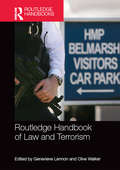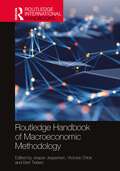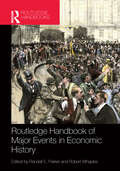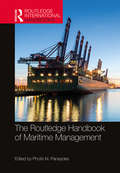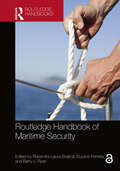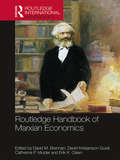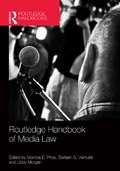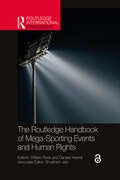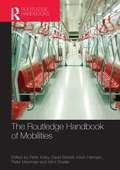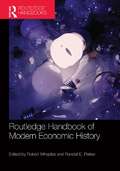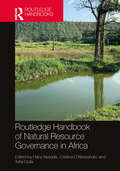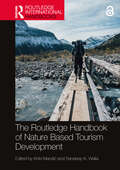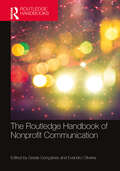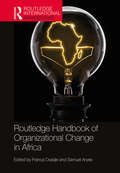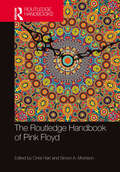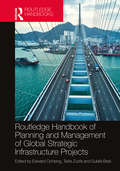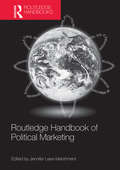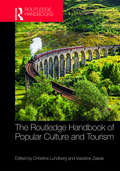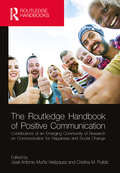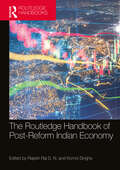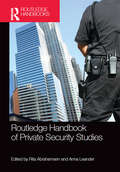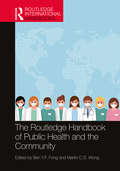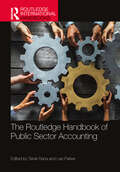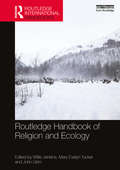- Table View
- List View
Routledge Handbook of Law and Terrorism
by Clive Walker Genevieve LennonIn the years since 9/11, counter-terrorism law and policy has proliferated across the world. This handbook comprehensively surveys how the law has been deployed in all aspects of counter-terrorism. It provides an authoritative and critical analysis of counter-terrorism laws in domestic jurisdictions, taking a comparative approach to a range of jurisdictions, especially the UK, the US, Australia, Canada, and Europe. The contributions to the book are written by experts in the field of terrorism law and policy, allowing for discussion of a wide range of regulatory responses and strategies of governance. The book is divided into four parts, reflective of established counter-terrorism strategic approaches, and covers key themes such as: Policing and special powers, including surveillance Criminal offences and court processes Prevention of radicalisation and manifestations of extremism Protective/preparative security The penology of terrorism In addressing counter-terrorism laws across a broad range of topics and jurisdictions, the handbook will be of great interest and use to researchers, students and practitioners in criminal law, counter-terrorism, and security studies.
Routledge Handbook of Macroeconomic Methodology (Routledge International Handbooks)
by Jesper Jespersen Victoria Chick Bert TiebenThe present macroeconomic crisis has demonstrated that a deeper understanding of the importance of relevant macroeconomic theories and methods is wanting. Additionally, lack of methodological awareness is behind much of the disagreement within macroeconomics which, looked upon from outside, often appears incomprehensible. The Handbook gives a structured presentation of the study of principles and procedures by which macroeconomics is researched, taught and communicated both within academia and to a wider audience, and why specific theories, research strategies and teaching are preferred. The principles of selecting theory relevant to real-world problems are the core of methodology. This book contains a broad range of arguments behind theory construction and appraisal and the consequences of these choices within the field of macroeconomics. An international range of experts provide clear analysis of key concepts, ideas and principles to give academics, students and others a better understanding of the macroeconomics behind policy conclusions which are put forward at different levels.
Routledge Handbook of Major Events in Economic History (Routledge International Handbooks)
by Randall E. Parker Robert WhaplesThe Handbook of Major Events in Economic History aims to introduce readers to the important macroeconomic events of the past two hundred years. The chapters endeavour to explain what went on and why during the most significant economic epochs of the nineteenth, twentieth and early twenty-first centuries and how where we are today fits in this historical timeline. Its short chapters reflect the most up-to-date research and are written by well-known economists who are authorities on their subjects. The Handbook of Major Events in Economic History was written with the intent of presenting the professional consensus in explaining the economics driving these historical events.
The Routledge Handbook of Maritime Management (Routledge International Handbooks)
by Photis M. PanayidesThis handbook provides a wide-ranging, coherent, and systematic analysis of maritime management, policy, and strategy development. It undertakes a comprehensive examination of the fields of management and policy-making in shipping by bringing together chapters on key topics of seminal scientific and practical importance. Within 21 original chapters, authoritative experts describe and analyze concepts at the cutting edge of knowledge in shipping. Themes include maritime management and policy, ship finance, port and maritime economics, and maritime logistics. A study examines the determinants of ship management fees. Aspects of corporate governance in the shipping industry are reviewed and there is a critical review of the ship investment literature. Other topics featured include the organization and management of tanker and dry bulk shipping companies, environmental management in shipping with reference to energy-efficient ship operation, a study of the BIMCO Shipping KPI standard, utilizing the Bunker Adjustment Factor as a strategic decision-making instrument, and slow steaming in the maritime industry. All chapters are written to provide implications for further advancement in professional practice and research. The Routledge Handbook of Maritime Management will be of great interest to relevant students, researchers, academics, and professionals alike. It provides abundant opportunities to guide further research in the areas covered but will also initiate and inspire effective maritime management.
Routledge Handbook of Maritime Security
by Ruxandra-Laura BoşilcăThis handbook offers a critical and substantial analysis of maritime security and documents the most pressing strategic, economic, socio-cultural and legal questions surrounding it. Written by leading international experts, this comprehensive volume presents a wide variety of theoretical positions on maritime security, detailing its achievements and outlining outstanding issues faced by those in the field. The book includes studies which cover the entire spectrum of activity along which maritime security is developing, including, piracy, cyber security, energy security, terrorism, narco-subs and illegal fishing. Demonstrating the transformative character and potential of the topic, the book is divided into two parts. The first part exhibits a range of perspectives and new approaches to maritime security, and the second explores emerging developments in the practice of security at sea, as well as regional studies written by local maritime security experts. Taken together, these contributions provide a compelling account of the evolving maritime security environment, casting fresh light on theoretical and empirical aspects. The book will be of much interest to practitioners and students of maritime security, naval studies, security studies, maritime history, and International Relations in general.
Routledge Handbook of Maritime Security
by Ruxandra-Laura Boşilcă Susana Ferreira Barry J. RyanThis handbook offers a critical and substantial analysis of maritime security and documents the most pressing strategic, economic, socio-cultural and legal questions surrounding it. Written by leading international experts, this comprehensive volume presents a wide variety of theoretical positions on maritime security, detailing its achievements and outlining outstanding issues faced by those in the field. The book includes studies which cover the entire spectrum of activity along which maritime security is developing, including, piracy, cyber security, energy security, terrorism, narco-subs and illegal fishing. Demonstrating the transformative character and potential of the topic, the book is divided into two parts. The first part exhibits a range of perspectives and new approaches to maritime security, and the second explores emerging developments in the practice of security at sea, as well as regional studies written by local maritime security experts. Taken together, these contributions provide a compelling account of the evolving maritime security environment, casting fresh light on theoretical and empirical aspects.The book will be of much interest to practitioners and students of maritime security, naval studies, security studies, maritime history, and International Relations in general.
Routledge Handbook of Marxian Economics (Routledge International Handbooks)
by Catherine P. Mulder David Kristjanson-Gural David M. Brennan Erik K. OlsenMost developed economies are characterized by high levels of inequality and an inability to provide stability or opportunity for many of their citizens. Mainstream economics has proven to be of little assistance in addressing these systemic failures, and this has led both scholars and students to seek alternatives. One such alternative is provided by Marxian economics. In recent decades the field has seen tremendous theoretical development and Marxian perspectives have begun to appear in public discourse in unprecedented ways. This handbook contains thirty-seven original essays from a wide range of leading international scholars, recognized for their expertise in different areas of Marxian economics. Its scope is broad, ranging from contributions on familiar Marxist concepts such as value theory, the labor process, accumulation, crisis and socialism, to others not always associated with the Marxian canon, like feminism, ecology, international migration and epistemology. This breadth of coverage reflects the development of Marxian economic and social theory, and encompasses both the history and the frontiers of current scholarship. This handbook provides an extensive statement of the current shape and future direction of Marxian economics. The Routledge Handbook of Marxian Economics is an invaluable resource for students, researchers and policy makers seeking guidance in this field. It is designed to serve both as a reference work and as a supplementary text for classroom use, with applications for courses in economics, sociology, political science, management, anthropology, development studies, philosophy and history.
Routledge Handbook of Media Law
by Monroe E. Price Stefaan Verhulst Libby MorganFeaturing specially commissioned chapters from experts in the field of media and communications law, this book provides an authoritative survey of media law from a comparative perspective. The handbook does not simply offer a synopsis of the state of affairs in media law jurisprudence, rather it provides a better understanding of the forces that generate media rules, norms, and standards against the background of major transformations in the way information is mediated as a result of democratization, economic development, cultural change, globalization and technological innovation. The book addresses a range of issues including: Media Law and Evolving Concepts of Democracy Network neutrality and traffic management Public Service Broadcasting in Europe Interception of Communication and Surveillance in Russia State secrets, leaks and the media A variety of rule-making institutions are considered, including administrative, and judicial entities within and outside government, but also entities such as associations and corporations that generate binding rules. The book assesses the emerging role of supranational economic and political groupings as well as non-Western models, such as China and India, where cultural attitudes toward media freedoms are often very different. Monroe E. Price is Director of the Center for Global Communication Studies at the Annenberg School for the University of Pennsylvania and Joseph and Sadie Danciger Professor of Law and Director of the Howard M. Squadron Program in Law, Media and Society at the Cardozo School of Law. Stefaan Verhulst is Chief of Research at the Markle Foundation. Previously he was the co-founder and co-director, with Professor Monroe Price, of the Programme in Comparative Media Law and Policy (PCMLP) at Oxford University, as well as senior research fellow at the Centre for Socio Legal Studies. Libby Morgan is the Associate Director of the Center for Global Communication Studies at the Annenberg School for the University of Pennsylvania.
The Routledge Handbook of Mega-Sporting Events and Human Rights (Routledge International Handbooks)
by William Rook Daniela Heerdt Shubham JainThe Routledge Handbook of Mega-Sporting Events and Human Rights is the first book to explore in depth the topic of mega-sporting events (MSEs) and human rights, offering accounts of adverse human rights impacts linked to MSEs while considering the potential for promoting human rights in and through the framework of these events.Drawing on the contributions of an international group of leading researchers, practitioners and advocates, the book introduces key concepts in human rights and considers how they relate to ethical, social, managerial and governance issues in contemporary MSEs, from inclusion and welfare to corruption and sustainability. It examines the role of key stakeholders in the delivery of MSEs, including organising committees, sport governing bodies, governments, athletes, sponsors and broadcasters, as well as the role of activists and advocates, and presents historical and contemporary case studies of human rights as an active issue in MSEs. The book provides new perspectives on human rights as a lens for understanding modern sport and as a guiding principle for responsible sport that protects the interests of individuals and communities, as well as offering guidance on best practice.It is essential reading for all advanced students, researchers, practitioners, policymakers and stakeholders with an interest in organisation and delivery of MSEs, as well as general sport management, sport policy, sport governance, the ethics of sport, event management, political science, development studies, ethical business or the significance of sport in wider society.
The Routledge Handbook of Mobilities
by Kevin Hannam Mimi Sheller Peter Merriman Peter Adey David BissellThe 21st century seems to be on the move, perhaps even more so than the last. With cheap travel, and more than two billion cars projected worldwide for 2030. And yet, all this mobility is happening incredibly unevenly, at different paces and intensities, with varying impacts and consequences to the extent that life on the move might be actually quite difficult to sustain environmentally, socially and ethically. As a result 'mobility' has become a keyword of the social sciences; delineating a new domain of concepts, approaches, methodologies and techniques which seek to understand the character and quality of these trends. This Handbook explores and critically evaluates the debates, approaches, controversies and methodologies, inherent to this rapidly expanding discipline. It brings together leading specialists from range of backgrounds and geographical regions to provide an authoritative and comprehensive overview of this field, conveying cutting edge research in an accessible way whilst giving detailed grounding in the evolution of past debates on mobilities. It illustrates disciplinary trends and pathways, from migration studies and transport history to communications research, featuring methodological innovations and developments and conceptual histories - from feminist theory to tourist studies. It explores the dominant figures of mobility, from children to soldiers and the mobility impaired; the disparate materialities of mobility such as flows of water and waste to the vectors of viruses; key infrastructures such as logistics systems to the informal services of megacity slums, and the important mobility events around which our world turns; from going on vacation to the commute, to the catastrophic disruption of mobility systems. The text is forward-thinking, projecting the future of mobilities as they might be lived, transformed and studied, and possibly, brought to an end. International in focus, the book transcends disciplinary and national boundaries to explore mobilities as they are understood from different perspectives, different fields, countries and standpoints. This is an invaluable resource for all those with an interest in mobility across disciplinary boundaries and areas of study.
The Routledge Handbook of Modern Economic History (Routledge International Handbooks)
by Robert Whaples Randall E. ParkerThe Routledge Handbook of Modern Economic History aims to introduce readers to important approaches and findings of economic historians who study the modern world. Its short chapters reflect the most up-to-date research and are written by well-known economic historians who are authorities on their subjects. Modern economic history blends two approaches – Cliometrics (which focuses on measuring economic variables and explicitly testing theories about the historical performance and development of the economy) and the New Institutional Economics (which focuses on how social, cultural, legal and organizational norms and rules shape economic outcomes and their evolution). Part 1 of the Handbook introduces these approaches and other important methodological issues for economic history. The most fundamental shift in the economic history of the world began about two and a half centuries ago when eons of slow economic change and faltering economic growth gave way to sustained, rapid economic expansion. Part 2 examines this theme and the primary forces economic historians have linked to economic growth, stagnation and fluctuations – including technological change, entrepreneurship, competition, the biological environment, war, financial panics and business cycles. Part 3 examines the evolution of broad sectors that typify a modern economy including agriculture, banking, transportation, health care, housing, and entertainment. It begins by examining an equally important "sector" of the economy which scholars have increasingly analyzed using economic tools – religion. Part 4 focuses on the work force and human outcomes including inequality, labor markets, unions, education, immigration, slavery, urbanization, and the evolving economic roles of women and African-Americans. The text will be of great value to those taking economic history courses as well as a reference book useful to professional practitioners, policy makers and the public.
Routledge Handbook of Natural Resource Governance in Africa
by Hany Besada, Cristina D’Alessandro and Tefsi GollaThe Routledge Handbook of Natural Resource Governance in Africa provides a comprehensive analysis of African natural resource governance, stretching across the continent, and encompassing water, land, extractive resources, and mining.Africa’s natural resources are not only crucial for the continent from an economic, environmental, and political perspective, but they are also of significant geopolitical importance, with direct implication for meeting the global challenges outlined in the Sustainable Development Goals. Whether an abundance of natural resources proves to be a curse or a blessing depends on the nature, extent, and outcome of the effort and experience of an individual country in governing and managing such assets. It is with this in mind that this ground-breaking handbook brings together experts from across the field of natural resource development to reflect on the varied regime types and paradigms within the continent’s natural resource sectors, the specific challenges they face, and their role within global value chains. The book first considers governance for sustainable development and discourses of land and development financing, before going on to investigate the regulatory and policy impacts, and socioeconomic implications of natural resource management. Finally, the Handbook situates the African continent within the emerging global energy transition; examining trends in South-South cooperation, and new frontiers for the harnessing of critical tools in a sustainable future for natural resource governance and management.Overall, the Handbook’s in-depth analysis provides a unique blend of realism and optimism, highlighting the importance of building a new sustainable African resource narrative for shared prosperity. The handbook will be an essential read for researchers and policy makers with an interest in sustainable development and natural resource governance in Africa.
The Routledge Handbook of Nature Based Tourism Development (Routledge International Handbooks)
by Ante Mandić Sandeep K. WaliaThis handbook offers a comprehensive overview of the themes and concepts related to nature-based tourism development. Providing interdisciplinary insights from leading researchers, academics, and practitioners across the globe, it delivers a critical and timely contribution to the knowledge around nature-based tourism. Nature-based tourism is currently the fastest-growing tourism sector globally and for many destinations, the most significant tourism segment. Organized into five parts, this handbook provides contemporary and cutting-edge perspectives on core topics and explores their linkages. It considers, among others, various natural settings and natural attractions where nature-based tourism can be exercised, including: protected and conserved areas, islands, and mountains; the emerging themes shaping the contemporary nature-based tourism development, including ethics, Sustainable Development Goals, COVID-19 crisis, over-tourism, climate change, resilience; and new approaches toward the visitor management and low-impact experience design, including regenerative and transformative tourism, destination stewardship and pro-environmental behaviour. Part I introduces the concept of nature-based tourism and the emerging challenges in the field. Part II explores the key components in the management and planning of nature-based tourism development. In Part III the handbook focuses on visitor experience design and management and Part IV highlights the impacts of nature-based tourism. Part V examines the future of nature-based tourism and possible solutions to mitigate associated challenges in the field. The handbook offers a valuable contribution with a systematic outlook of the phenomenon of nature-based tourism and critical perspectives on key concepts, policy, and practice. It shares current knowledge, innovative tools, and sustainable solutions with substantial evidence and societal impact. The book will appeal to students, researchers, and professionals in the fields of tourism, human geography, leisure studies, business studies, and sociology.
The Routledge Handbook of Nonprofit Communication (Routledge Handbooks in Communication Studies)
by Gisela Gonçalves Evandro OliveiraThis handbook brings together multidisciplinary and internationally diverse contributors to provide an overview of theory, research, and practice in the nonprofit and nongovernmental organization (NGO) communication field. It is structured in four main parts: the first introduces metatheoretical and multidisciplinary approaches to the nonprofit sector; the second offers distinctive structural approaches to communication and their models of reputation, marketing, and communication management; the third focuses on nonprofit organizations’ strategic communications, strategies, and discourses; and the fourth assembles campaigns and case studies of different areas of practice, causes, and geographies. The handbook is essential reading for scholars, educators, and advanced students in nonprofit and NGO communication within public relations and strategic communication, organizational communication, sociology, management, economics, marketing, and political science, as well as a useful reference for leaders and communication professionals in the nonprofit sector.
Routledge Handbook of Organizational Change in Africa (Routledge International Handbooks)
by Franca Ovadje Samuel AryeeAlthough change management and therefore effective adaptation to environmental complexity is considered a uniquely human cultural activity, the extensive change management literature is largely based on the experiences of organizations in the advanced economies of the West. As the economies of African countries become increasingly open, African organizations will need to be agile in order to adapt and grow in a dynamic, global environment. Currently, there is a dearth of contextualized knowledge on change management within Africa, but this handbook aims to address this by bringing together a wide range of experts to explore organizational change and change management from an African context. The handbook adopts a multidisciplinary (historical, philosophical, processual, and strategic) perspective as well as empirical accounts of change management. It addresses such issues as: What are the external and internal pressures for change? What is the content and process of change management? What are the essentials of effective change management? How can change management be theorized from an African perspective? What sort of leadership can best align with change management demands in an African context? How do organizations build internal change management capability? It is hoped that answers to these questions contained in the handbook will provide a contextualized understanding of change management which African organizations and scholars can leverage to respond to the threats and opportunities inherent in their increasingly dynamic environment. The handbook should constitute an essential reference for academics, researchers, and advanced students of change management, development studies, and African studies, as well as practitioners.
The Routledge Handbook of Pink Floyd (Routledge Music Handbooks)
by Chris Hart Simon A. MorrisonThe Routledge Handbook of Pink Floyd is intended for scholars and researchers of popular music, as well as music industry professionals and fans of the band. It brings together international researchers to assess, evaluate and reformulate approaches to the critical study and interpretation of one of the world’s most important and successful bands. For the first time, this Handbook will ‘tear down the wall,’ examining the band’s collective artistic creations and the influence of social, technological, commercial and political environments over several decades on their work. Divided into five parts, the book provides a thoroughly contextualised overview of the musical works of Pink Floyd, including coverage of performance and sound; media, reception and fandom; genre; periods of Pink Floyd’s work; and aesthetics and subjectivity. Drawing on art, design, performance, culture and counterculture, emergent theoretical resources and analytical frames are evaluated and discussed from across the social sciences, humanities and creative arts. The Handbook is intended for scholars and researchers of popular music, as well as music industry professionals. It will appeal across a range of related subjects from music production to cultural studies and media/communication studies.
Routledge Handbook of Planning and Management of Global Strategic Infrastructure Projects
by Edward Ochieng Tarila Zuofa Sulafa BadiThis book examines complex challenges in managing major strategic economic and social infrastructure projects. It is divided into four primary themes: value-based approach to infrastructure systems appraisal, enabling planning and execution, financing and contracting strategies for infrastructure systems and digitising major infrastructure delivery. Within these four themes, the chapters of the book cover: the value and benefits of infrastructure projects planning for resilient major infrastructure projects sustainable major infrastructure development and management, including during mega events improving infrastructure project financing stakeholder engagement and multi-partner collaborations delivering major infrastructure projects effectively and efficiently whole-life-cycle performance, operations and maintenance relationship risks on major infrastructure projects public-private partnerships, design thinking principles, and innovation and technology. By drawing on insights from their research, the editors and contributors bring a fresh perspective to the transformation of major strategic infrastructure projects. This text is designed to help policymakers and investors select and prioritise their infrastructure needs beyond the constraining logic of political cycles. It offers a practical set of recommendations for governments on attracting private capital for infrastructure projects while creating clear social and economic value for their citizens. Through theoretical underpinning, empirical data and in-depth informative global case studies, the book presents an essential resource for students, researchers, practitioners and policymakers interested in all aspects of strategic infrastructure planning, project management, construction management, engineering and business management.
Routledge Handbook of Political Marketing
by Jennifer Lees-MarshmentWith the Obama campaign universally acknowledged as the most successfully marketed presidential campaign of all time, the future of political marketing is fiercely contested, provoking a wealth of high quality scholarship from across the globe. This work provides an accessible introduction to the field, international in both content and authorship, which will set the direction of future research. Routledge Handbook of Political Marketing contains cutting edge contributions written by academic experts and informed practitioners but will also have a cohesive structure, containing emerging areas and authors alongside established ones. The handbook addresses the practicalities as well as the broader impact of political marketing on politics including its’ role in the changing relationship between political leaders, parties and voters. With each chapter providing a comparative and carefully structured discussion of a key topic, the handbook examines issues within the following broad themes: Understanding the market, gathering ideas, and debate Product development, branding and strategy Internal Marketing Communicating and connecting with the public Government Marketing - delivery, policy and leadership With each chapter written to a common template presenting new research and contemporary case studies, the handbook combines a succinct presentation of the latest research with an accessible and systematic format that will be of great interest to scholars and practitioners alike.
The Routledge Handbook of Popular Culture and Tourism
by Christine Lundberg Vassilios ZiakasThis handbook provides a comprehensive overview and holistic analysis of the intersection between tourism and popular culture. It examines current debates, questions and controversies of tourism in the wake of popular culture phenomena and explores the relationships between popular culture, globalization, tourism and mobility. In addition, it offers a cross-disciplinary, cutting edge review of the character of popular cultural production and consumption trends, analyzing their consequences for tourism, spatial strategies and destination competitiveness. The scope of the volume encompasses various expressions of popular culture such as cinema, TV shows, music, literature, sports and heritage. Featuring a mix of theoretical and empirical chapters, the handbook problematizes and conceptualizes the ties and clusters of popular cultural actors, thereby positioning tourism within the wider context of creative economies, cultural planning and multimodal technologies. Written by an international team of academics with expertise in a range of disciplines, this timely book will be of interest to researchers from a variety of subjects including tourism, events, geography, cultural studies, fandom research, political economy, business, media studies and technology.
The Routledge Handbook of Positive Communication: Contributions of an Emerging Community of Research on Communication for Happiness and Social Change (Routledge Handbooks in Communication Studies)
by José Antonio Muñiz Velázquez Cristina M. PulidoThe Routledge Handbook of Positive Communication forms a comprehensive reference point for cross-disciplinary approaches to understanding the central role of communication in the construction of hedonic and eudemonic happiness,or subjective and psychological well-being. Including contributions from internationally recognized authors in their respective fields, this reference uses as its focus five main scenarios where communication affects the life of individuals: mass and digital media, advertising and marketing communication, external and internal communication in companies and organizations, communication in education, and communication in daily life interactions.
The Routledge Handbook of Post-Reform Indian Economy
by Rajesh Raj S. N. and Komol SinghaThis handbook presents a comprehensive study of the post-reform Indian economy, three decades after the economic liberalization started in the early 1990s. It studies the broad range of changes that were introduced in the reforms era, assessing their impact on sectors like manufacturing, agriculture, banking and finance, among others. It also assesses the performance of these sectors amid globalization and the socio-economic shifts in the country. The volume evaluates the contribution of the reforms to social transformation, social inclusion, sustainability and human development, and deliberates on the gains, blind spots and limitations. With contributions from scholars across the country, case studies and comparative analyses that draw on data analysis, econometric evidence and historical sensibility, this is an authoritative volume on the reforms of the 1990s and their impact on the Indian economy and people. Topical and the first of its kind, the book will be a useful resource for scholars and researchers of economics, development studies, political economy, management studies, public policy and political studies.
Routledge Handbook of Private Security Studies
by Rita Abrahamsen & Anna LeanderThis new Handbook offers a comprehensive overview of current research on private security and military companies, comprising essays by leading scholars from around the world. The increasing privatization of security across the globe has been the subject of much debate and controversy, inciting fears of private warfare and even the collapse of the state. This volume provides the first comprehensive overview of the range of issues raised by contemporary security privatization, offering both a survey of the numerous roles performed by private actors and an analysis of their implications and effects. Ranging from the mundane to the spectacular, from secretive intelligence gathering and neighbourhood surveillance to piracy control and warfare, this Handbook shows how private actors are involved in both domestic and international security provision and governance. It places this involvement in historical perspective, and demonstrates how the impact of security privatization goes well beyond the security field to influence diverse social, economic and political relationships and institutions. Finally, this volume analyses the evolving regulation of the global private security sector. Seeking to overcome the disciplinary boundaries that have plagued the study of private security, the Handbook promotes an interdisciplinary approach and contains contributions from a range of disciplines, including international relations, politics, criminology, law, sociology, geography and anthropology. This book will be of much interest to students of private security companies, global governance, military studies, security studies and IR in general.
The Routledge Handbook of Public Health and the Community (Routledge International Handbooks)
by Ben Y.F. FongCommunity health is an emerging and growing discipline of public health and it focuses on the physical, social, and mental well-being of the people of specific districts. This interdisciplinary field brings together aspects of health care, economics, environment, and people interaction. This handbook is a comprehensive reference on public health for higher education students, scholars, practitioners, and policymakers of health care. There are five key thematic sections in the book: perspectives in public health; community health in practise; planning, built, and social environment and community health; digital and mobile health; and, towards sustainable health in the community. Each theme explores the leading research and trends. This book aims to help achieve the shared goal of healthier communities and quality of life for the residents. This collaborative work should be a very useful handbook to health professionals and government bodies in the planning of initiatives to improve population health, prevent chronic diseases, control infectious diseases and outbreaks, and prepare for natural disasters. This handbook integrates research and practise of public health in the community.
The Routledge Handbook of Public Sector Accounting (Routledge International Handbooks)
by Tarek Rana Lee ParkerThe Routledge Handbook of Public Sector Accounting explores new developments and transformations in auditing, management control, performance measurement, risk management and sustainability work in the contemporary world of the public sector and the functioning of accounting and management in that realm. It focuses on critical analysis and reflection with respect to changing risk and crisis management patterns in the public sector in the current Covid- 19 and post- Covid- 19 era, across diverse social, political and institutional settings globally. This research-based edited book, targeted at scholars, professionals, teachers and consultants inthe fields of public sector accounting, auditing, accountability and management, offers high-level insights into the new architecture and execution of such activities in the emerging post-pandemic world. The chapters are written by leading scholars in the accounting and public administration disciplines internationally and provide important assessments, frameworks and recommendations concerning a wide variety of institutions, practices and policies with a view to addressing the many emerging societal, governmental and professional issues. Spanning theoretical, empirical and policy discussion contributions, the book’s chapters will be readily accessible to accounting, auditing and management audiences alike.
Routledge Handbook of Religion and Ecology (Routledge Environment and Sustainability Handbooks)
by Willis Jenkins, Mary Evelyn Tucker and John GrimThe moral values and interpretive systems of religions are crucially involved in how people imagine the challenges of sustainability and how societies mobilize to enhance ecosystem resilience and human well-being. The Routledge Handbook of Religion and Ecology provides the most comprehensive and authoritative overview of the field. It encourages both appreciative and critical angles regarding religious traditions, communities, attitude, and practices. It presents contrasting ways of thinking about "religion" and about "ecology" and about ways of connecting the two terms. Written by a team of leading international experts, the Handbook discusses dynamics of change within religious traditions as well as their roles in responding to global challenges such as climate change, water, conservation, food and population. It explores the interpretations of indigenous traditions regarding modern environmental problems drawing on such concepts as lifeway and indigenous knowledge. This volume uniquely intersects the field of religion and ecology with new directions within the humanities and the sciences. This interdisciplinary volume is an essential reference for scholars and students across the social sciences and humanities and for all those looking to understand the significance of religion in environmental studies and policy.
